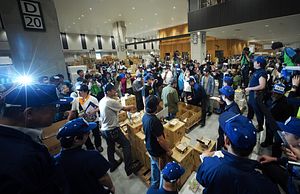The aging Tsukiji Wholesale Market, famous for early morning tuna action, shut its doors after eight decades, transferring its operations over four days to a new facility on a manmade island in nearby Toyosu. Growing concerns over Tsukiji’s sanitation, earthquake resistance, and fire safety standards became a political battleground fraught with controversy that set a much needed relocation back by a costly two years.
The strong smell of 1,800 tons of seafood passing through daily might not appeal to many. But Tsukiji is a tourist magnet, topping Japan’s list of most visited attractions among international visitors. It’s both a symbol of traditional cuisine — referred to as “Japan’s kitchen” — and the backbone of Japan’s seafood and sushi industry, being the first point of contact for high-end and chain sushi restaurants alike.
But after a fire in August last year, the charred remains of a section of Tsukiji served as a dangerous reminder of the market’s overcrowding and outdated electrical fittings while exposing its gritty and dilapidated exterior. Unlike Tsukiji, the specially designed Toyosu market is indoors and almost double in size. Efforts to strengthen hygiene management have been made through air conditioning and air curtains that deflect dust and maintain the temperature at 14.5 degrees to meet international standards.
The move to bring life back into the overburdened Tsukiji was proposed decades ago, with officials setting their eyes on the vacant former gas plant owned by Tokyo Gas Co. in 2001. But a political game of chess erupted between the Tokyo metropolitan government, the former mayor of Tokyo, and Tokyo Gas when government negotiations for the land sale went ahead behind closed doors in secret.
When Tokyo Governor Yuriko Koike came into office in August 2016, relocation plans set for November 2016 were postponed after groundwater and soil contamination beneath the site revealed high concentrations of toxic chemicals such as benzene 100 times over environmental safety standards. A political spectacle later ensued as decontamination measures to replace polluted soil with clean topsoil did not take place beneath major buildings in September 2016. Through July this year, the Tokyo metropolitan government forked out an additional 38 million yen ($340,000) for stronger safety measures, introducing ventilation equipment, sealing building basements with concrete, and adding equipment to continuously monitor ground water pollution levels.
Koike gave the go ahead for the relocation preparations, now with a total price tag of 600 billion yen, in June. But to make matters worse, a month before opening the city discovered cracks and unlevel ground due to the location sinking, which necessitated emergency construction.
On Thursday, Koike attended the opening and expressed hope Toyosu will become Japan’s core seafood trading hub, “transferring product assessment expertise fostered at Tsukiji market.” Koike’s vision to redevelop Toyosu as “a food theme park” won’t be easy without a fresh take on local and international rebranding and promotion. Toyosu is also up against changes in the amount of seafood and produce that go through wholesale markets — now at 50 percent, down from 80 percent in fiscal year 1989 — and changes in fish consumption trends.
The 900 businesses that surround the seafood hub and rely heavily on a steady supply of fresh fish followed the market to its new home. The mammoth project brought in 2,600 forklifts and turret trucks; to avoid traffic congestion, a section of a newly built expressway not yet open to the public was temporarily opened for relocation.
Toyosu fish market opened its doors to the public on Saturday, but this time without unique access to the auction rooms and up close tours offering instead a view of the activity through a glass observation deck on the second floor.
Tsukiji market will be dismantled and demolished by February 2020 to make way for a new parking lot for the Tokyo Olympics and Paralympics.
































